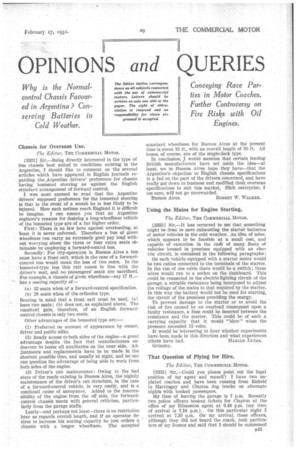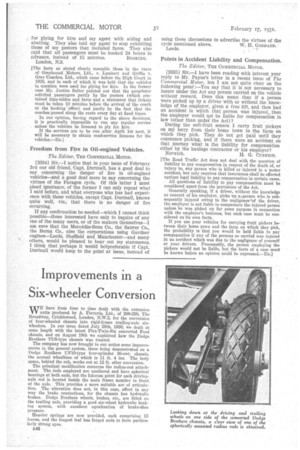OPINIONS and QUERIES Chassis for Overseas Use.
Page 73

Page 74

If you've noticed an error in this article please click here to report it so we can fix it.
The Editor, THE COMMERCIAL MOTOR.
[3331) Sir,—Being directly interested in the type of bus chassis best suited to conditions existing in the, Argentine, I should like to comment on the several articles which have appeared in English journals regarding the Argentine drivers' preference for chassis having bonneted steering as against the English standard arrangement of forward control.
I was most amused to read that the Argentine drivers' supposed preference for the bonneted steering is that in the event of a smash he is less likely to be injured. Bow such notions reach England it is difficult to imagine. I can assure you that an Argentine engineer's reasons for desiring a long-wheelbase vehicle of the bonneted type are of a far higher order.
First: There is no law here against overloading, at least it is never enforced. Therefore a bus of given wheelbase can carry an extremely good pay load without worrying about the three or four extra seats obtainable by employing a forward-control bus.
Secondly: For city-operation in Buenos Aires a bus must have a front exit, which in the case of a forwardcontrol bus would mean the loss of two seats. In the bonneted-type bus this exit comes in line with the driver's seat, and no passengers' seats are sacrificed. For example, a chassis of given wheelbase—say 17 ft.— has a seating capacity of fal 32 seats when of a forward-control specification. (b) 28 seats when of the orthodox type.
Bearing in mind that a front exit must be used, fa ) loses two seats; (b) does not, as explained above. The resultant gain, therefore, of an English forwardcontrol chassis is only two seats.
Other advantages of the bonneted type are z—
(l.) Preferred on account of appearance by owner, driver and public alike.
(2) Ready access to both sides of the engine—a great advantage despite the fact that manufacturers endeavour to house all auxiliaries on the near side. Adjustments and replacements have to be made in the shortest possible time, and usually at night, and no one can question the advantage of being able to work from both sides of the engine.
(3) Driver's cab maintenance : Owing to the bad state of the roads existing in Buenos Aires, the nightly maintenance of the driver's cab structure, in the case of a forward-control vehicle, is very costly, and is a continual cause of annoyance. Added to the inaccessibility of the engine from the off side, the forwardcontrol chassis meets with general criticism, particularly from the garage staffs.
Lastly—and perhaps not least—there is no restriction here as regards overall length, and if an operator desires to increase his seating capacity he just orders a chassis with a longer wheelbase. The accepted standard wheelbase for Buenos Aires at the present time is about 19 ft., with an Overall length of 30 ft. All buses, of course, are of the single-deck type.
In conclusion,): would mention that certain leading British manufacturers have set aside the idea—at least, we in Buenos Aires hope they have—that the A.rgentine's objection to English chassis specifications is a fad on the part of the drivers concerned, anti have really got down to business and modified their, overseas specifications to suit this market. Stch enterprise, I am sure, will not go unrewarded.
Buenos Aires. ROBERT W. WALKER.
Using the Mains for Engine Starting.
The Editor, THE COMMERCIAL MOTOR..
[3332) Sir,—It has occurred to me that something might be done to save exhausting the starter batteries of motor vehicles in the cold weather. An idea of mine, which appears to be feasible at a small cost, am] capable of execution in the ca & of many fleets of vehicles housed in premises equipped with an electric circuit, is contained in the following paragraphs: On each vehicle equipped with a starter motor would he two cables connected to the terminals of the starter. In the run of one cable there would be a switch ; these wires would run to a socket on the dashboard. This could be connected to the electric-lighting circuit of the garage, a suitable resistance being interposed to adjust the voltage of the mains to that required by the starter. In this way the battery would not be used for starting, the circuit of the premises providing the energy.
To prevent damage to the starter or to avoid the risk of fire caused by an overload consequent upon a faulty resistance, a fuse could be inserted between the resistance and the starter. This could be of such a carrying capacity that it would " blow " when the pressure exceeded 15 volts.
It would be interesting to hear whether experiments have been made in this direction and what experiences
others have had. HAROLD Luis. Grimsby.
That Question of Plying for Hire, The Editor, THE CommERcIAL MOTOR.
[3333] Sir,—Could you please point out the legal position of my agent and myself? I have two unplated coaches and have been running from Enfield to klarringay and Clanton dog tracks on alternate nights with booked passengers.
My time of leaving the garage is 7 p.m. Recently two police officers booked tickets for Clanton at theoffice a my Edmonton agent at 6.48 p.m. (my time of arrival is 7.10 p.m.). On this particular night I arrived at 7.20 p.m. On my arrival, these officers, although they did not hoard the coach, took particulars of my licence and said that I should be summoned
for plying for hire and my agent with aiding and abetting. They also told my agent to stop exhibiting those of my posters that included fares. They also raid that all passengers must be booked 24 hours in advance, instead of 15 minutes. Booxixo. London, N.9.
[The facts as stated closely resemble those in the cases of Greyhound .Motors, Ltd., v. Lambert and Griffin v. Grey Coaches, Ltd., which came before the High Court in 1923, and in each of which it was held that the vehicles question were used for plying for hire. In the former case Mr. Justice Salter pointed out that the proprietor solicited passengers partly by the posters (which contained time-tables and fares and a statement that tickets must be taken 10 minutes before the arrival of the coach at the booking 'office) and partly by the fact that the coaches passed along the route every day at fixed times.
In our opinion, having regard to the above decisions, it is practically impossible to run any regular service unless the vehicles be licensed to ply for hire.
If the services are to be run after April let next, it will be necessary to obtain road-service licences for the vehicles.—Eod
Freedom from Fire in Oil-engined Vehicles.
The Editor, THE COMMERCIAL MOTOR.
[3334] Sir,—I notice that in your issue of February 3rd our old friend, Capt. Durtnall, has a good deal to say concerning the danger of fire in oil-engined vehicles—and a good deal more to say concerning the virtues of the Paragon cycle. Of this latter I must plead ignorance, of the former I can only repeat what I said before, and what everyone who has had experience with these vehicles, except Capt. Durtnall, knows quite well, viz., that there is no danger of fire occurring.
If any confirmation be needed—which I cannot think possible—those interested have only to inquire of any one of the many users, or of the makers themselves—I am sure that the Merceas-Benz Co., the Saurer Co., the Berna Co., also the corporations using Gardner engines—Leeds, Sheffield and Manchester—and many others, would be pleased to bear out my statements. I think that perhaps it would be)preferable if Capt. Durtnall would keep to the point at issue, instead of using these discussions to advertise the virtues of the
cycle mentioned above. W. H. CrODDARD. Leeds.
Points in Accident Liability and Compensation.
The Editor, THE COMMERCIAL MOTOR.
[3335] Sir,—I have been reading with interest your reply to Mr. Payne's letter in a recent issue of The Commercial Motor, but I am not quite clear on the following point :—You say that it is not necessary to insure under the Act any person carried on the vehicle without reward. Does this mean that if a person were picked up by a driver with or without the knowledge of the employer, given a free lift, and then had an accident in which that person was bajured,.then the employer would not be liable for compensation in law (other than uncle; the Act)?
During the soft-fruit season I carry fruit pickers on my lorry from their home town to the farm on which they pick. They do not get paid until they commence picking, and if there were an accident on that journey what is the liability for compensation either by the haulage contractor or his employer?
Norwich. H. G. CUSHION.
[The Road Traffic Act does not deal with the question of liability to pay compensation in respect of the death of, or injury to, any person who is killed or injured in a motor accident, but only requires that insurances shall be effected against legal liability to pay compensation in certain cases. All questions of liability to pay compensation must be considered apart from the provisions of the Act.
Generally speaking, if a driver, without the knowledge or consent of his employer, picks up a4person who is subsequently injured owing to the negligence4of the driver, the employer is not liable to compensate the injured person unless he was picked up for some purpose in connection with the employer's business, but each case must be considered on its own facts.
If you use your vehicles for carrying fruit pickers between their home town and the farm on which they pick, the probability is that you would be held liable to pay compensation if any of the persons so carried was injured in an accident which was due to the negligence of yourself or your drivers. Presumably, the person employing the pickers would not be liable, but the facts of a case must be known before an opinion could be expressed.—En.]






















































































































